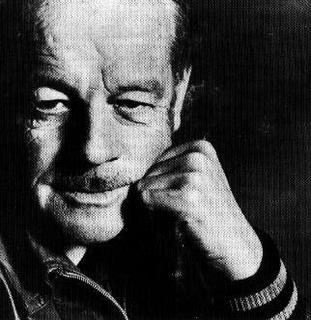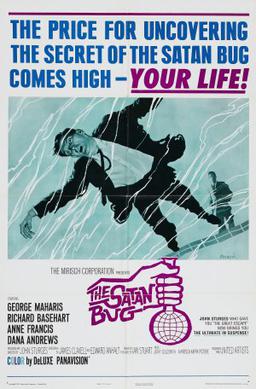
Botulinum toxin, or botulinum neurotoxin, is a highly potent neurotoxic protein produced by the bacterium Clostridium botulinum and related species. It prevents the release of the neurotransmitter acetylcholine from axon endings at the neuromuscular junction, thus causing flaccid paralysis. The toxin causes the disease botulism. The toxin is also used commercially for medical and cosmetic purposes. Botulinum toxin is an acetylcholine release inhibitor and a neuromuscular blocking agent.
Incapacitating agent is a chemical or biological agent which renders a person unable to harm themselves or others, regardless of consciousness.
A techno-thriller or technothriller is a hybrid genre drawing from science fiction, thrillers, spy fiction, action, and war novels. They include a disproportionate amount of technical details on their subject matter ; only hard science fiction tends towards a comparable level of supporting detail on the technical side. The inner workings of technology and the mechanics of various disciplines are thoroughly explored, and the plot often turns on the particulars of that exploration. This genre began to exist and establish itself in the early 20th century with further developments and focus on the genre in the mid 20th century.

Alistair Stuart MacLean was a Scottish novelist who wrote popular thrillers and adventure stories. Many of his novels have been adapted to film, most notably The Guns of Navarone (1957) and Ice Station Zebra (1963). In the late 1960s, encouraged by film producer Elliott Kastner, MacLean began to write original screenplays, concurrently with an accompanying novel. The most successful was the first of these, the 1968 film Where Eagles Dare, which was also a bestselling novel. MacLean also published two novels under the pseudonym Ian Stuart. His books are estimated to have sold over 150 million copies, making him one of the best-selling fiction authors of all time.

The Scarecrow is a supervillain appearing in American comic books published by DC Comics. Created by Bill Finger and Bob Kane, the character first appeared in World's Finest Comics #3 as an adversary of the superhero Batman. He has since become one of Batman's most enduring enemies belonging to the collective of villains that make up his rogues gallery.

Ice Station Zebra is a 1963 thriller novel written by Scottish author Alistair MacLean. It marked a return to MacLean's classic Arctic setting. After completing this novel, whose plot line parallels real-life events during the Cold War, MacLean retired from writing for three years. In 1968 it was loosely adapted into a film of the same name.

Porton Down is a science and defence technology campus in Wiltshire, England, just north-east of the village of Porton, near Salisbury. It is home to two British government facilities: a site of the Ministry of Defence's Defence Science and Technology Laboratory – known for over 100 years as one of the UK's most secretive and controversial military research facilities, occupying 7,000 acres (2,800 ha) – and a site of the UK Health Security Agency. Since 2018, part of the campus has housed Porton Science Park, which is owned and operated by Wiltshire Council and has private sector companies in the health, life science and defence and security sectors.

The Satan Bug is a 1965 American crime science fiction suspense film from United Artists, produced and directed by John Sturges, that stars George Maharis, Richard Basehart, Anne Francis, and Dana Andrews. The screenplay by James Clavell and Edward Anhalt was loosely based on the 1962 novel of the same name by Alistair MacLean, written under the pseudonym Ian Stuart. The film score was composed by Jerry Goldsmith. The film featured the first use of a stabilized camera mount, invented by Nelson Tyler, placed on a helicopter.

Fear Is the Key is a 1961 first-person narrative thriller novel by Scottish author Alistair MacLean.

When Eight Bells Toll is a first-person narrative novel written by Scottish author Alistair MacLean and published in 1966. It marked MacLean's return after a three-year gap, following the publication of Ice Station Zebra (1963), during which time he had run several restaurants.

Floodgate is a novel by Scottish author Alistair MacLean, first published in 1983.

The Golden Gate is a novel written by the Scottish author Alistair MacLean. It was first released in the United Kingdom by Collins in 1976 and later in the same year by Doubleday in the United States.

Caravan to Vaccarès is a novel by author Alistair MacLean, originally published in 1970. This novel is set in the Provence region of southern France. The novel was originally written as a screenplay for producer Elliot Kastner.

The Dark Crusader is a 1961 thriller novel by Scottish author Alistair MacLean. The book was initially published under the pseudonym Ian Stuart and later under his true name. It was released in the United States under the title: The Black Shrike.

When Eight Bells Toll is a 1971 action film directed by Étienne Périer and starring Anthony Hopkins, Jack Hawkins, Robert Morley, and Nathalie Delon. Set in Scotland, it is based upon Scottish author Alistair MacLean's 1965 novel of the same name. Producer Elliott Kastner planned to produce a string of realistic gritty espionage thrillers to rival the James Bond series, but the film's poor box office receipts ended his plans.

The Hostage Tower is a 1980 American spy and thriller television film starring Peter Fonda and Douglas Fairbanks Jr., and directed by Claudio Guzmán, well known for his work in sitcoms. It is based on a story by Alistair MacLean. A book based on MacLean's story by John Denis was the first in the series of UNACO books.

Puppet on a Chain is a 1970 British thriller film directed by Geoffrey Reeve and starring Sven-Bertil Taube, Barbara Parkins and Alexander Knox. It is based on the 1969 novel Puppet on a Chain by Alistair MacLean.

Fear Is the Key is a 1972 British action thriller film directed by Michael Tuchner and starring Barry Newman and Suzy Kendall. It is based on the 1961 novel of the same title by Alistair MacLean. It was the feature film debut of Ben Kingsley. The soundtrack is by Roy Budd.
Air Force One Is Down is a 2013 action television miniseries divided in two parts loosely based on a story by Alistair MacLean that was improvised on a 1981 novel by John Denis. The film stars Jeremy Sisto, Jamie Thomas King, Emilie de Ravin, Rupert Graves, Ken Duken and Linda Hamilton.
Biological warfare (BW)—also known as bacteriological warfare, or germ warfare—has had a presence in popular culture for over 100 years. Public interest in it became intense during the Cold War, especially the 1960s and '70s, and continues unabated. This article comprises a list of popular culture works referencing BW or bioterrorism, but not those pertaining to natural, or unintentional, epidemics.















